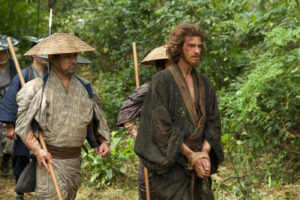Starring: Andrew Garfield, Adam Driver and Liam Neeson
Directed By: Martin Scorsese
Rated: R
Running Time: 161 minutes
Paramount Pictures
Our Score: 4 out of 5 Stars
Very rarely do you have a religious piece of filmmaking that doesn’t question religion or support the existence of a greater entity. Martin Scorsese is no stranger to the topic; raising hell with “The Last Temptation of Christ,” but his latest film is a deep meditation and self-reflection on the topic. The myriad of ideas behind “Silence” are a little too insurmountable to summarize without glossing over one or two powerful and important themes. Nothing about this feels like your stereotypical Scorsese movie, which means it’s all substance and no style.
The movie follows Jesuit priests, Sebastia Rodrigues (Garfield) and Francisco Garupe (Driver). They receive a distressing letter about their mentor, Father Cristovao Ferreira (Neeson). He’s apparently committed apostasy and disappeared in post-Feudal Japan. Despite warnings about the inherent dangers of being a Christian during the Kakure Kirishitan era, a time when Christians were deep in hiding in Japan and feared being publicly executed for their beliefs, the duo head off with nothing but their faith and an alcoholic guide looking to be forgiven for his past sins.
While the first act establishes 17th century Japan, the rest of the movie follows Sebastia. There’s nothing unique about him, I guess that’s just how the cards fell in terms of storytelling and/or history. Both Sebastia and Francisco are devout men, struggling to deal with the harsh reality of potentially being murdered for their religion in a foreign land, as they watch as others are brutally slain in their God’s name, and in inherently, their names as well.
“Silence” is a struggle of morality, faith, and life. There are moments where Sebastia’s beliefs are selfish, wholesome, absurd, and compassionate. The clash of religious ideals stems from the Japanese power structure believing in Buddhism and viewing Christianity, not only as a threat, but as a toxic influence that can’t sprout in their land, which they constantly refer to as a swamp. And more frankly, the Japanese government sees Christianity as a sly form of Western intrusion and corruption. The philosophical struggles between the two beliefs don’t develop until halfway through “Silence” and that’s when they things get more profound.
We get to see the rotten and enlightened side of religion’s impact. It’s difficult to pinpoint an encompassing message in “Silence” because it plays out like a scholarly debate on faith. The three biggies in “Silence” are its reflection about how important and damning symbolism can be, it’s criticism about how humans can fetishize their own beliefs, the idols they keep close, and the images that they deem holy, and it’s praise for how religion can teach us compassion and give us silent strength when dealing with the impossible.
On a more personal level, Sebastia’s voice-over narration and internal monologue provide insight into his selfishness of wanting to be martyred much like Christ. Outside of Sebastia’s unintentional egocentric spiritual journey, it’s a humanistic learning exercise as he internalizes concerns that his prayers are said and uttered to an empty void with no one on the other end. Anyone who’s ever prayed can surely relate to that plight.
“Silence” isn’t entertaining in the traditional sense. You may find yourself bored if you aren’t willing to put your beliefs and other beliefs up for scrutiny or if you view religion as an intangible topic. “Silence” is not just an intense examination of religion, but it’s a study of societal ethics and personal morality as it relates to history, culture and your community. It’s not until the end that Sebastia aligns his priorities with what’s best for his. “Silence” may very well be Scorsese’s deeply religious message for those wanting to live life and find peace.



